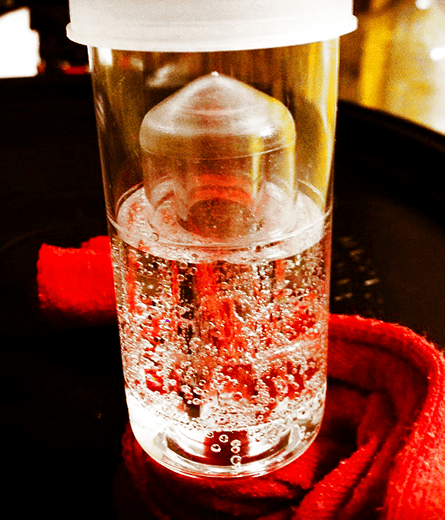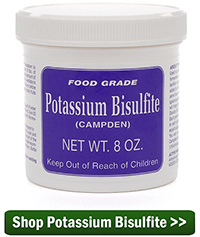 I am making several batches of wine and every one of them has formed a ring of black mold growing at the top of the airlock. I use cleanser water in the airlock assuming it will kill anything it comes in contact. What would cause this mold to form and will it hurt the wine?
I am making several batches of wine and every one of them has formed a ring of black mold growing at the top of the airlock. I use cleanser water in the airlock assuming it will kill anything it comes in contact. What would cause this mold to form and will it hurt the wine?
Greg R. — ID
—–
Hello Greg,
Not only is there mold growing in your airlock, there’s mold floating in the air, in our cars, on our clothes, in our homes. There’s mold spores everywhere, just in small enough numbers as to be of no consequence to anything or even to be detectable. But, if mold gets the right conditions, it can grow and colonize. Because of this, no matter how well you clean and sanitize a surface, mold can land and grow there if the conditions are right — temperature, humidity, sunlight, nutrients, etc.
The mold growing in your airlock, by itself, is not going to hurt the wine by being there. If there is a fermentation, CO2 gas will be blowing off keeping any mold spores from getting to the wine. However, this can become a big problem once the fermentation has stopped. Not only is there no protective gas blowing out through the airlock, there is a possibility that some air can flow backwards through the airlock and into the wine, taking mold spores along with it. If fact, if your fermentation is already complete, I would strongly urge you to add a dose of sulfite to the wine, if you have not done so already, This could be either Campden tablets, potassium metabisulfite or sodium metabisulfite.
 I normally don’t recommend this, but since you have a stubborn mold growth going on, you may want to consider filling your airlock with a high-alcohol distillate such as grain alcohol or Everclear. This will keep your airlock continuously free of mold growth and kill any mold spores that my be trying to get their way into your precious wine. Also, if the alcohol gets sucked into the wine for whatever reason, it would not harm it. Any mold spores in the alcohol will be dead.
I normally don’t recommend this, but since you have a stubborn mold growth going on, you may want to consider filling your airlock with a high-alcohol distillate such as grain alcohol or Everclear. This will keep your airlock continuously free of mold growth and kill any mold spores that my be trying to get their way into your precious wine. Also, if the alcohol gets sucked into the wine for whatever reason, it would not harm it. Any mold spores in the alcohol will be dead.
The reason I don’t normally recommend using alcohol in an airlock is because the alcohol evaporates rather quickly and can cause the airlock to go dry if you are not paying attention. But you can go this route. Just understand that you will need to add more alcohol every few days. Don’t let the airlock go dry; check it often.
Having mold growing in airlocks is not a pressing issue that winemakers normally have to deal with. Sanitizing the airlocks and filling them with water is usually enough, but it seems that there is a lot of mold in your neck of the woods right now, so it is something that needs to be dealt with. Don’t feel that you will always need to use alcohol in your airlocks. Next time you make wine there may be no mold growth in the airlock at all.
Happy Wine Making,
Ed Kraus
—————————————————————————————————————–
Ed Kraus is a 3rd generation home brewer/winemaker and has been an owner of E. C. Kraus since 1999. He has been helping individuals make better wine and beer for over 25 years.

Hi Ed —
I’ve had this problem, too. Probably since I keep my carboys in a dirt basement. I’ve often filled the air lock with brandy, and I’ve had quite a few go dry.
So what about this? When fermentation is done, pull the airlock and shove in a santized rubber bung. Any drawbacks to that?
Cheers,
Bobby
Bobby, sealing them up with a rubber stopper/bung is fine, but there are two things you need to watch. First, the you need to make sure the fermentation has completely finished. You don’t want an air-tight container fermenting. Second, you need to wire down the stopper with some bailing wire or similar. As the wine’s temperature changes it expands and contracts. If it expands too much it can pop the rubber stopper out.
I use Glycerine in the airlocks instead of water. It will not evaporate or dry out and seems to provide a sterile environment in the airlock.
Just use new glycerine with each batch. You can find this in stock
at E C Krause.
I read with interest " Mold in the airlock" I have always used a solution of Metabisulfite in my air locks. Never had a problem. Is this a risky thing to do?
Panuska, there is nothing wrong with adding sulfites to you airlock. I assures that it is sanitary at that point in time. However, it is important to understand that the gases in the sulfite (the stuff that does all the work) will leave once the airlock starts bubbling, so while adding sulfite to the airlock will get you started off on the right foot, it will not protect the airlock over time.
I have black speck in my air lock what does this mean and is my wine still good
Pat, it sounds like mold forming in your airlock. The mold growing in your airlock, by itself, is not going to hurt the wine by being there. If there is a fermentation, CO2 gas will be blowing off keeping any mold spores from getting to the wine. However, this can become a big problem once the fermentation has stopped. Not only is there no protective gas blowing out through the airlock, there is a possibility that some air can flow backwards through the airlock and into the wine, taking mold spores along with it. If fact, if your fermentation is already complete, I would strongly urge you to add a dose of sulfite to the wine, if you have not done so already, This could be either Campden tablets, potassium metabisulfite or sodium metabisulfite. The article posted below will discuss this issue further.
Mold Growing In Airlock
https://blog.eckraus.com/mold-growing-in-airlocks
To prevent the alcohol in the airlock from drying out, has anybody tried adding a half capful of oil to the top? In the RV community, some people will add oil on top of the toilet water. The water reinforces the seal and the oil keeps the water from evaporating. It may be worth trying in this scenario.